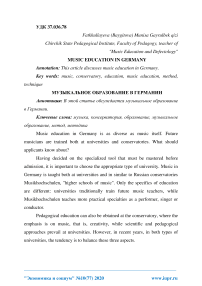Music education in Germany
Автор: Fatkhullayeva Baygitova M.G.
Журнал: Экономика и социум @ekonomika-socium
Рубрика: Основной раздел
Статья в выпуске: 10 (77), 2020 года.
Бесплатный доступ
This article discusses music education in Germany.
Music, conservatory, education, music education, method, technique
Короткий адрес: https://sciup.org/140251418
IDR: 140251418 | УДК: 37.036.78
Текст научной статьи Music education in Germany
Music education in Germany is as diverse as music itself. Future musicians are trained both at universities and conservatories. What should applicants know about?
Having decided on the specialized tool that must be mastered before admission, it is important to choose the appropriate type of university. Music in Germany is taught both at universities and in similar to Russian conservatories Musikhochschulen, "higher schools of music". Only the specifics of education are different: universities traditionally train future music teachers, while Musikhochschulen teaches more practical specialties as a performer, singer or conductor.
Pedagogical education can also be obtained at the conservatory, where the emphasis is on music, that is, creativity, while scientific and pedagogical approaches prevail at universities. However, in recent years, in both types of universities, the tendency is to balance these three aspects.
Students of pedagogical music faculties are characterized by a broad outlook and variety of interests, while instrumental students have a desire to thoroughly and deeply study the instrument and the art of using it.
The mere desire to study is not yet a happy ticket to the university. For admission to both the university and the conservatory, those wishing to devote themselves to music will have to first of all prove that they have the most important thing - talent. You will have to hand over the game on the main and additional instruments, as well as solfeggio, harmony and German.
The number of entrance exams is impressive, but it's actually not that difficult. First, the exams are spread over several days and correspond to the level of knowledge of a graduate of a music school in Russia. Secondly, the applicant chooses works for performance on the main and additional instruments independently and in advance. So with responsible preparation, there are chances for admission.
As for the language exam, for admission to the conservatory (Musikhochschule), foreign students need only have knowledge of the German language - at the level of the third stage of the DaF test (TestDaF Stufe3). Moreover, in some universities of this type, a musically gifted foreign applicant who has passed the specialty and harmony with excellent marks, but failed in German, may be allowed to retake it later.
Universities with German examinations are stricter. After all, graduates-teachers should be fluent in the language in which they will teach in the future. Therefore, foreign applicants entering the music faculties of German universities, along with specialized disciplines, also pass the DSH language exam.
The process of teaching future musicians is also structured differently in Germany. Conservative students who are focused on creativity and honing their playing skills will face one-on-one work with a professor, small group sessions and intense, sometimes grueling stage activities. In a word, everything that, at first glance, cannot be boasted by university students, classes in which, abundantly flavored with theory, are usually held in huge lecture halls.
Didactics, psychology and pedagogy, especially if studying them in a foreign language, are not always easy for foreign students. However, for all the monumental and academic nature of universities, there are many disciplines, such as composition, writing musicals or working with a choir, that require creative and innovative thinking.
As for the prospects after receiving a diploma, here you will have to rely only on yourself. By the way, according to statistics, Germany's need for teachers is growing from year to year. Graduates advise, already during their studies, to conduct an active concert activity and, if desired, try to get a job in a theater or opera orchestra.
Список литературы Music education in Germany
- Бокщанина Е. Методика преподавания музыкальной литературы в училище. - М.: Музгиз, 1961. - 72 с.
- Гейлиг М. Очерки по методике преподавания музыкальной литературы в училище. - М.: Музыка, 1966. - 58 с.
- Голубева Л. О новой концепции курса музыкальной литературы ДМШ // Музыкальное просвещение. - 2007. - № 1. - С. 39-43.
- Лагутин А. Музыкальная литература как предмет школьного преподавания // Вопросы методики начального музыкального образования. - М.: Музыка, 1981.
- Никифорова В. О преемственности в преподавании музыкально-исторических дисциплин при обучении музыковеда // Вопросы преподавания музыкально-исторических дисциплин: Сб. тр. - М.: Гос. Муз. Пед. Ин-т им. Гнесиных, 1985. - С. 34-51.
- Орлова Е. Методические записки о музыкально-историческом образовании в консерваториях. - М.: Музыка, 1983. - 43 с.
- Царева Е. Музыка прежде всего // Как преподавать музыкальную литературу [сборник статей]. - М.: Классика-XXI, 2007. - 172 с. - 978-5-89817-1 84-1. ISBN: 978-5-89817-184-1


